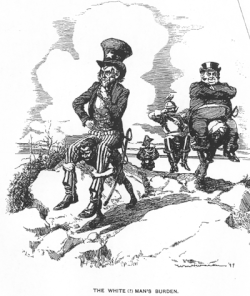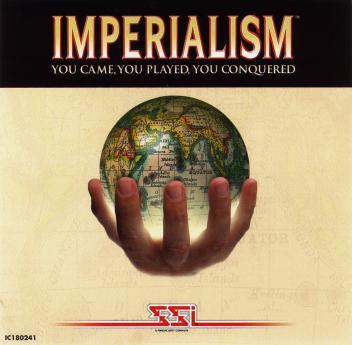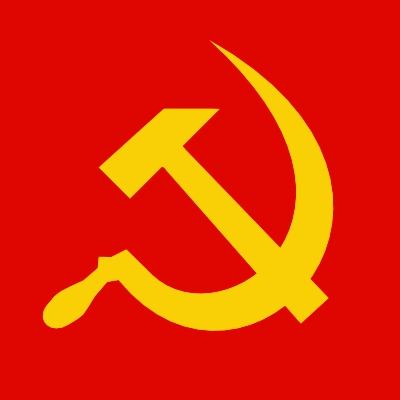This short manifesto by Lewis is literally just him saying "blast" and then naming something he dislikes. Which seems to be pretty much everything. He says "Curse" and "Blast" to so many different things, that an argument is hard to come by in this short reading. However, there is one thing he does not "blast", and that is the "Real". He says to blast the arch enemy of the real, implying that he favors the real.
This would show that he only hates these things because none of them are "real". This was written near the start of WWI, and by this time the War was inevitable. This manifesto seems to be saying that America should be only focused on this war at hand and forget and block out absolutely everything else, that will not help them win the war.
Why is this written in such a strange fashion?
Monday, April 30, 2012
Wednesday, April 11, 2012
"The White Man's Burden", Kipling
This poem is a white man that is telling his "fellow white people" to take up the white man's burden. As he talks about what the white people should do, he seems like he is saying that they need to make the other people of the world live better. The second to last stanza says "Ye dare not stoop to less-- Nor call too loud on Freedom" It talks about making th eother people free and not stooping to less, or in other words, do not live like the other nations and peoples live.
This poem seems to be about the belief of imperialism. It talks to the white men, telling them to go out into the world and conquer other peoples and "train" them in the white man's ways. The end of the first stanza is "Your new-caught. sullen peoples. Half-devil and half-child." This shows that the white men had conquered the other people, and were looking at them as savages (half-devil). This poem is cruel to the people outside America, as well as "non-whites" inside America. One thing that is not clear, is if this poem is satyrical or not. So,
is this poem satyrical or serious?
This poem seems to be about the belief of imperialism. It talks to the white men, telling them to go out into the world and conquer other peoples and "train" them in the white man's ways. The end of the first stanza is "Your new-caught. sullen peoples. Half-devil and half-child." This shows that the white men had conquered the other people, and were looking at them as savages (half-devil). This poem is cruel to the people outside America, as well as "non-whites" inside America. One thing that is not clear, is if this poem is satyrical or not. So,
is this poem satyrical or serious?
"Shooting an Elephant", Orwell
In this story the narrator is a police officer for the English that everyone hates. He is jeered at and tripped by people (in soccer), and is very angry with how people treat him. He hates hits job and doesn't even know why he does it anymore. One day, he receives reports of a wild elephant rampaging through the town. So he takes a rifle which he knows is not strong enough to kill the elephant, and goes. He cannot find the elephant and everyone has a different story. He does not even believe the reports until he sees a mangled body left by the elephant. Eventually they find the elephant, and it looks calm so he does not wish to shoot it. However, the people followed him and are eagerly awaiting him to shoot it. He does shoot and eventually kill it solely not to look foolish.
This story seems to be highly symbolic of World War II. Specifically with the elephant and the police officer. The elephant seems to represent Germany to some extent, and the police officer seems to represent the American government. When the elephant is angry it takes and does whatever it wants, and no one had the ability to stop it. The officer thinking to himself that his gun would never kill an elephant seems to represent the idea of how weak the American army was compared to Germany's. Also, when the man shoots the elephant, it is solely for the crowd's appeasement, which may have been somewhat true in the real case. Finally, at the end of the story, the officer says that he is glad that the man was killed, because it put him on the legally "right" side of the conflict. This is a statement that America did not truly care for the children and men and women in the Holocaust, but instead used them as their excuse for attacking Germany.
What is Orwell's stance on WWII?
Monday, April 9, 2012
"The Communist Manifesto", Marx and Engels
One major problem with the communist system is that there would be little to no initiative. In a capitalist society, many inventions and accomplishments are based on the fact that people know they will get money for what they have done, and possibly a significant amount. In the communist system people will never get any more or less for what they do, so Scientists, engineers, doctors, and everyone else as well may not care to make or do anything spectacular, because they will receive nothing more than usual.
What is the difference betweeen Socialism and Communism?
Monday, April 2, 2012
A Man Said to the Universe
This very short poem by Stephen crane isn't much to summarize, however it is a confusing poem at first glance and can be analysed deeply. This poem is literally only 5 short lines, and they seem to make no sense. A man has a conversation with the universe, in which he tells it that he exists. The universe tells the man that that fact has not given the universe any obligation to the man.
This poem connects to the idea of Deism, in which God is the divine "Watch-maker", and he made creation and is now simply allowing it to run its course. This is shown through several points. One, when the man tells the universe he exists, he says "sir". This shows that he is talking to someone, not the universe as a whole, and the universe seems to represent God. After the man says this, the God answers him by saying "However, the fact has not created in me a sense of Obligation." This means that this presence has no obligation to look after or "care" for the man. A Deist believes that God is no longer with creation, but there was a God who created it all.
This poem connects to the idea of Deism, in which God is the divine "Watch-maker", and he made creation and is now simply allowing it to run its course. This is shown through several points. One, when the man tells the universe he exists, he says "sir". This shows that he is talking to someone, not the universe as a whole, and the universe seems to represent God. After the man says this, the God answers him by saying "However, the fact has not created in me a sense of Obligation." This means that this presence has no obligation to look after or "care" for the man. A Deist believes that God is no longer with creation, but there was a God who created it all.
If this analysis is true, the wouldn't God not have answered at all?
Subscribe to:
Posts (Atom)




